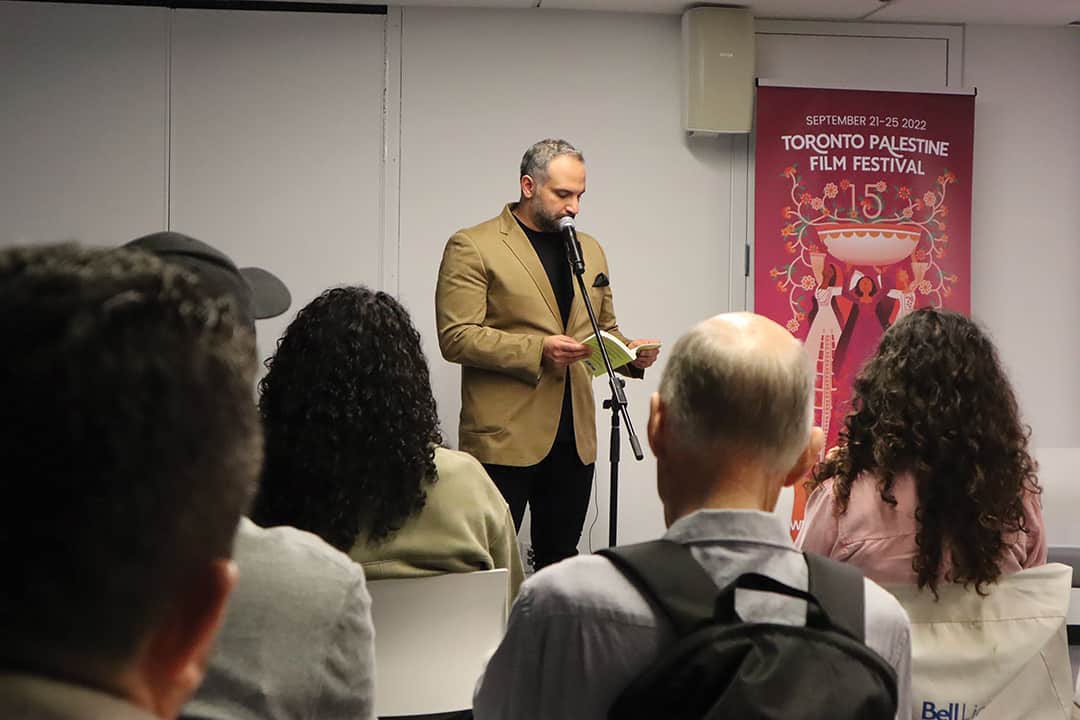The first words that come to mind when I think of the Toronto Palestine Film Festival (TPFF) are joyful resistance.
The TPFF began as an artistic project by a group of local activists in 2008 to commemorate the 60th anniversary of the Nakba. The Nakba — Arabic for “the catastrophe” — is a sombre day in Palestinian history that commemorates when Israeli militias terrorized and forcibly removed hundreds of thousands of Palestinian people from their homes during the establishment of Israel in 1948.
After the huge success of the original commemorative film festival, the TPFF has expanded its breadth and has been screening a variety of Palestinian films every year for the past 15 years. This year it ran from September 21 to 25.
Whether it be via an atmospheric documentary or a piece of satire, the festival has allowed Palestinians living in Toronto to see their present struggles and family histories reflected on screen. It was also a rare and empowering space for an oft-silenced community to feel heard.
Fresh takes on film
I attended the TPFF and saw two very different films, which is a testament to the diversity of voices in Palestinian filmmaking. The first was Photobooth, directed by John Greyson, which is an outrageous and quirky documentary about the Boycott, Divestment and Sanction (BDS) movement in the form of a satirical musical opera.
The film traces the history, nuances, and challenges of pro-Palestine movements such as BDS and the pinkwashing of Israel in an outlandish narrative fashion. Photobooth weaves cameos from big-name scholars such as Judith Butler and Angela Davis into an absurdist storyline about a Palestinian-Torontonian student activist’s quest to sabotage Israel’s performance in the Eurovision song contest, resulting in an oddly educational and refreshing discussion about activism and LGBTQ+ culture.
The film was shot largely in Toronto and also weaved in many Toronto-specific references: York University’s central hall served as the set of an Israeli prison, and the two main villains of the film — a drag queen and her henchman — were named after one of Canada’s most famous billionaire Zionist couples, Heather Reismann and Gerry Schwartz. The student activist protagonist was aided by gay French novelist Jean Genet and conspired with the Toronto Zoo’s gay penguins to raise awareness about the BDS movement and save the day.
The movie felt perfectly crafted for queer Palestinian-Torontonians. But it was certainly a movie that appeals to very specific, and comparatively privileged, Western sensibilities; Photobooth deals with the experiences of the diaspora instead of the grim reality faced by those living in occupied Palestine itself. However, its refreshing humour and absurdism makes it a delightful antidote to the disillusionment and shared frustration of Palestinian Canadians and their allies.
The second movie I saw was Recovery by Rashid Masharawi, a documentary that used old photographs and videos from before the Israeli occupation to bring the historical port city of Jaffa back to life. The voice of a former resident of Jaffa narrates black and white photos of markets, beaches, movie theaters, and bustling harbours which have been animated to look like they are moving.
Recovery was particularly meaningful to me because of my own family’s story; Israeli forces expelled my grandfather and his family from Jaffa during the Nakba. To see the city’s beauty revived on the screen allowed me and my relatives, whom I took to the screening, to fondly remember a home we had lost, a home we were never fully allowed to know.
Impact on the Palestinian community
In an interview with The Varsity, Dania Majid, who has been a TPFF organizer since the festival’s inception, said that the TPFF is trying to create a space where people can “be proudly Palestinian without fear of backlash.”
Fear and erasure are common feelings among most Palestinians in the diaspora, including myself. I grew up feeling the need to lie about my ethnicity and say I was from somewhere else in the Middle East to avoid confrontation. To say one is Palestinian is often taken not as a fact, but as a political statement — a statement that welcomes debate and unwanted commentary.
Majid explained that, although Palestinian TPFF attendees are at “different stages” in their self-acceptance and some are still hesitant to voice their identities, coming to the TPFF leaves them feeling very empowered. “They’re like, ‘Wow… a Palestinian movie in a public space on the big screen’… It’s helping people ease into [the fact that] no, you have every right to be here.”
The idea that there was no “developed” or legitimate Palestinian presence before Israel’s creation is also a misconception Majid hopes to dispel through the festival’s films. “We were a very cultured and educated and developed society, whether it be from the agriculture point of view or from the academic point of view… our population is exceptionally talented and these talents are [shown] in these movies.”
“We’ve had films about female race car drivers and soccer players… just a whole range of different storytelling,” Majid added. “And yes, the politics may come in in different ways. But there are so many different stories and people… We’re not just victims of the occupation or of the Nakba, we have a vision and hope for the future.”
Editor’s note (October 4, 2022): The original version of this article referred to the film festival as the Toronto Palestinian Film Festival. In fact, the film festival is called the Toronto Palestine Film Festival.


